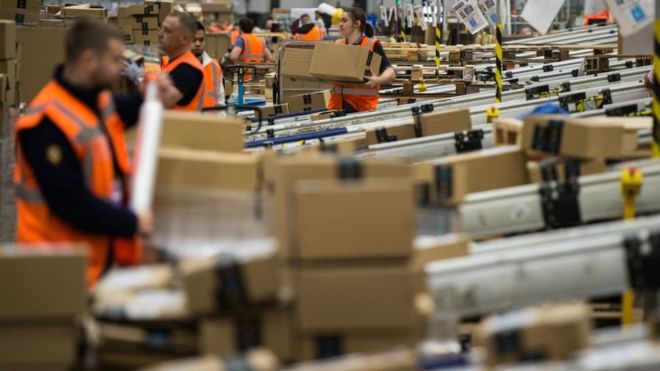Amazon shakes healthcare business
June 29, 2018 | Expert Insights

Amazon said it is buying online pharmacy PillPack for an undisclosed sum. In January, Amazon announced a partnership with J.P. Morgan and Berkshire Hathaway, where the three corporate giants will be forming an independent health company.
This sparked fears that Amazon will be entering the pharmaceutical industry and disrupt it considerably.
Background
Amazon is an American electronic commerce and cloud computing company that was founded on July 5, 1994. It started as an online bookstore and later diversified to sell various commodities like electrical appliances and apparel. It’s market value had exceeded $500 billion in July 2017.
Despite Amazon's sales growth, the firm's profits were nearly flat in 2017. This is because as it ploughed money into tech gadgets, streaming video, data centers, and warehouses to support its growing empire. Chief executive Jeff Bezos said the Amazon sales increase was in part down to the growing demand for the firm's smart home products. He said, “In the last month alone, we've launched five new Alexa-enabled devices, introduced Alexa in India, announced integration with BMW, surpassed 25,000 skills, integrated Alexa with Sonos speakers, taught Alexa to distinguish between two voices, and more.” Read more here.
There has been sustained criticism of the drug prices in the US. Prescription drug prices in the country are among the highest in the world. The high cost of prescription drugs became a major topic of discussion, leading up to the US healthcare reform debate of 2009, and received renewed attention in 2015.
In January, indicating growing frustration over high prices, Amazon, Berkshire Hathaway, and JPMorgan Chase announced that they will be forming an independent health company. This will reportedly take care of their employees within United States. This sparked fears that Amazon will be entering the pharmaceutical industry and disrupt it considerably. Read more here.
Analysis
Amazon announced its intention to move into the US healthcare business by acquiring online pharmacy group PillPack. PillPack delivers prescriptions to the homes of patients with chronic ailments, sending investors to drift away from traditional drugstore chains. PillPack’s acquisition follows months of anxiety in the healthcare industry after Amazon’s claims that it would start selling prescription drugs to make itself a one-stop shop for everything from batteries and clothing to television, film, music, and food.
Amazon already receives more than $4 out of every $10 spent online in the US, and the prospect of it entering the pharmacy business sent shares of American pharma companies plummeting on Wall Street. Walgreens Boots Alliance, which replaced General Electric in the Dow Jones Industrial Average, was down 10% by midday in New York trading, while CVS Health Corp, the largest drugstore operator, was down nearly 7%.
Last year, Amazon paid $13.7bn to buy Whole Foods to accelerate its ambitions in the food business, which had a similar effect on shares of grocery chains such as Kroger and Costco. However, most chains have recovered. This indicated Amazon’s push into healthcare may take longer than previously anticipated.
Walgreens Executive Chairman, Stefano Pessina, stated he did not believe Amazon’s move would have a major impact on the industry. "It is a declaration of intent from Amazon, but you see pharmacy work is much more complex than just delivering certain pills or certain packages,” Mr Pessina said. “I believe strongly . . . the role of the physical pharmacy will continue to be very, very important in the future."
Amazon did not disclose the terms of the PillPack deal, but the purchase price is estimated to be less than $1bn. The transaction is expected to close in the second half of this year, pending regulatory approval.
Recently, there have been several consolidations of firms in healthcare. This move by Amazon confirms its entry into the sector. CVS agreed to acquire health insurer Aetna for $69bn in December 2017, and in March Cigna, a rival health insurer, agreed to pay $67bn for Express Scripts. “It's part of the strategy that they've been slowly building brick by brick, but this acquisition is a major [development] . . . and may be the first step of many,” said Daniel Ives, analyst at GBH Insights.
Amazon has long eyed the drugstore business. In 1999, it bought a minority stake in Drugstore.com, but never fully integrated it into its core retail offering. Walgreens later bought the website and eventually shut it down in 2016. More recently, Amazon has pursued pharmacy licenses in several US states, held meetings with healthcare industry executives, and made several senior hires from insurers and pharmacy benefits managers. It has also joined with JPMorgan Chase and Berkshire Hathaway to create a not-for-profit healthcare company that aims to reduce bills for their employees and “potentially all Americans”.
In buying PillPack, Amazon is pursuing a similar strategy to its Whole Foods purchase: acquiring a company with an existing footprint in a market rather than trying to build a new business within its existing retail network. PillPack ships to 49 US states and is backed by several big-name investors, including Silicon Valley venture capital groups Accel and Menlo Ventures.
Assessment
Our assessment is that said the acquisition would create a competitive advantage for Amazon over both traditional pharmacies and online rivals, considering its extensive logistics network and customer base. Mail order deliveries represent a small proportion of the overall prescription market but has been seeing considerable growth given an ageing US population that could require higher levels of medical care in coming years.








Comments